Renault Scenic review – family-friendly electric SUV with impressive range
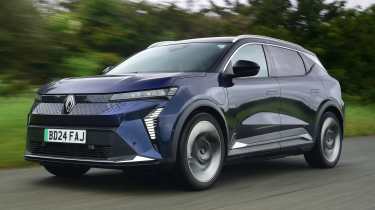

More and more car buyers are switching to electric cars each year. In fact, nearly a fifth of all new cars sold in the UK last year were battery powered, proving that more people are ready to make the switch to an EV.
And that could include you, too. There’s never been a better time to pick up an EV – they’re more capable than ever before, the UK’s public charging network is expanding and there are plenty of great electric car deals to be had if you do a bit of research. Last year saw the arrival of several affordable EVs, as well, so the tech is no longer reserved for just the well-heeled.
But knowing where to start with an electric car can be a bit of a challenge. There’s a lot of new jargon to get to grips with – range, battery size and charging speeds have taken the place of miles per gallon, CO2 emissions and engine size. But like any car purchase, the first thing to figure out is what type of car you need – our car-choosing checklist will help with this. Fortunately, there’s an electric car for every size and budget these days, so we should have you covered on this list.
So what makes an electric car one of the best? Besides the usual things that we rate highly here at Carbuyer – practicality, safety, comfort and value-for-money to name a few – a good electric car needs to have a decent range so you don’t have ‘range anxiety’ weighing on your mind. It should also be quick to charge – no one wants to be hanging around at a motorway service station longer than needed.
Like every car, an EV needs to be good to drive, too. Most have pretty nippy acceleration thanks to the inherently high torque of electric motors, but they're often heavier than an equivalent petrol car, so we always pay special attention to good suspension and body control when testing an EV. We’ve picked out 10 cars for this list that do all of the above better than the competition, so you can drive away in one of these electric cars with the confidence that you’ve got one of the best.
If you often drive long distances, take a look at our guide to the longest-range electric cars, while our list of the best plug-in hybrids may also appeal to town drivers who aren’t quite ready for a full EV. We’ve also covered the top 10 cheapest electric cars on sale for budget-conscious buyers.
The Scenic was reborn in 2024 as an all-new electric SUV. Despite ditching the old model’s MPV form factor, the new Scenic is still packed with plenty of family-friendly features, including a flat floor to improve passenger space and a vast boot. Perhaps the Scenic’s biggest selling point is its 379-mile range – an admirable figure for a car of this size and price point. If you don’t see yourself needing to travel that far, you can always pick the 261-mile model instead, and pocket yourself a decent saving.
The impressive range is achieved through some clever engineering that has kept the Scenic’s weight down to around 1,800kg. That pays dividends when it comes to the driving experience, too; the suspension is soft, taking the worst out of our lumpy roads, but there’s still decent body control. The 217bhp front-mounted motor isn’t going to pin you back in your seat, but it has more than enough punch for family buyers.
The cabin represents a big leap forward from the Renault of a few years ago. Materials are excellent, the technology is up there with the best in its class, while physical buttons remain for important functions like the climate controls. We think it's an excellent all-rounder, so we named it the best electric family car at the 2025 Carbuyer Awards.
| Pros | Cons |
|
|
It wasn’t so long ago that electric meant expensive. Now that the tech has had a good decade to mature, we’re now seeing much more affordable EVs appear, and the Citroen e-C3 is the best of the lot. The supermini starts from just under £22,000, which is a bit of a steal in our book. Sure, you can find cheaper EVs out there, but none offer the range, practicality and equipment you get with the e-C3.
Let’s get the important specs out of the way. The e-C3 gets a 44kWh battery which is good for up to 199 miles of range. For a car of this price point, that’s an impressive figure, and our testing proved it to be pretty accurate. It’s backed up by 100kW DC charging, which means a 20 to 80% charge will be done in around 26 minutes, which is quicker than its competitors.
But there’s so much else that the e-C3 gets right. Its boxy looks translate to loads of cabin space, and while interior quality isn’t the best, you at least get all the kit you could need. On the move, the e-C3 is wonderfully comfortable – the supple suspension and memory foam seats soak up pretty much every imperfection in the road. If you’re looking for a small EV, the e-C3 pretty much ticks every box, so you won’t be surprised to learn it’s our small electric car award winner for 2025.
| Pros | Cons |
|
|
We were mightily impressed by the Kia EV9 when we tested it last year. It isn’t just one of the best large electric SUVs on sale, it's one of the best large SUVs full stop. With masses of interior space, an excellent electric powertrain and a good driving experience, it ticks all the boxes that family car buyers need, while looking sharp from the outside, too.
Sure, it’s expensive at just over £65,000, but the EV9 couldn’t be any more different to a humble Kia Picanto or Ceed. It lives up to that lofty price tag with an interior that’s streets ahead of any model we’ve seen before from the brand in terms of quality and space. As expected, you get all the tech you could possibly want, plus physical controls for important interior functions and a choice of six or seven-seat configurations. Fold down the third row of seats and you have an enormous 828 litres of boot space.
All UK cars come with a 100kWh battery, hooked up to either a 201bhp single motor or a pair of motors in top-spec models, combining to produce 378bhp. The latter is surprisingly quick for a car of this size, but we think most buyers will be better off with the slower and cheaper option. It gets a better range, too, with up to 349 miles possible on a single charge.
| Pros | Cons |
|
|
The Skoda Enyaq is, on paper, a cut-price alternative to the Volkswagen ID.4 SUV. However, it’s far from inferior, offering more practicality and better value for money than the VW. Things got even better following its mid-life refresh – for example, entry-level Enyaqs now have a range of over 260 miles, while the equivalent VW has to settle for 221 miles between charges. We reckon the interior is better too, feeling more spacious and featuring a more intuitive infotainment system.
Skoda has packed the Enyaq with plenty of its innovative features, such as an umbrella in the door. For the eco-conscious, the interior can be made from recycled plastic bottles or leather that was tanned using olives from sustainable trees. Pair that with plenty of boot capacity and interior space, and this is an impressive electric SUV built for everyday life. For those willing to sacrifice a bit of space for more style, the svelte Skoda Enyaq Coupe is also available.
| Pros | Cons |
|
|
The main thing that struck us about the latest Hyundai Kona was how it looked – quite honestly there’s nothing else on the roads like it at the moment, thanks to its wide front and rear light bars and futuristic styling. Of course, looks are subjective, but thankfully there’s plenty more to like about the Kona Electric.
For starters, it feels a lot more grown up, polished and upmarket compared with its predecessor. We liked the high-quality materials used throughout the interior, and in the face of many other modern electric cars, the Kona Electric retains a good balance of physical and touchscreen-based controls, rather than ditching dials and switches entirely in favour of virtual ones.
It’s also larger than the old model, so its increased practicality now fits with its SUV looks. Hyundai is a brand at the forefront of the shift to electric power, so the Kona Electric’s powertrain is also pretty well sorted. It’s relaxed and refined to drive with even the lower-powered version providing enough oomph for most. You can expect up to 234 miles or 319 miles from a single charge, depending on the battery size, and both are fairly competitive given the price brackets they sit in.
| Pros | Cons |
|
|
Among the raft of new small electric SUVs that have cropped up recently, the Kia EV3 is one of the most impressive. It looks like someone shrunk an EV9 in the wash – which is no bad thing in our eyes – and the price tag has shrunk, too. Costing from around £33,000, the EV3 offers impressive specs, with 270 miles of range in the entry-level model. Spend a bit more, and you can upgrade to the bigger battery with 371 miles of range – more than the top-spec EV9.
Kia is right at the top of the interior game at the moment, and the EV3 is another home run. It delivers the three things a good interior should: space, technology and usability. Unlike the latest Volkswagens and Volvos, the EV3 still has plenty of physical controls for important functions, which are much easier to use than a touchscreen on the move. There are screens, though – three, to be precise – and they’re crisp and well-placed. In fact, the whole dashboard itself sits low so you have fantastic forward visibility.
Anything we don’t like? Well, there are a few scratchy plastics in places inside, and the driving experience is far from engaging. There’s more road noise than we’d like when you’re up to speed, too, but we can forgive these shortcomings given how well the EV3 performs in other areas.
| Pros | Cons |
|
|
We’ve made sure to include a couple of affordable EVs on this list, but what if you want the most opulent EV experience, money-no-object? Step forward the Mercedes EQS, the luxury brand’s flagship electric car costing a few quid short of six figures. In essence, the EQS is an electric Mercedes S-Class in all but name, offering the tech, comfort and refinement you’d expect from a big German limo.
But it's the EV tech under the skin that really impresses. The EQS is the longest-range electric car you can currently buy in the UK, with a stonking 481-mile range figure for the 450+ model. That’s thanks to its enormous 118kWh battery, but a maximum charging speed of 200kW means a 10-80% top up should only take around half an hour using a rapid charger.
Tipping the scales at two and a half tonnes, the EQS is a bit of a tank. You can feel that weight on the move, and the suspension can occasionally be thrown off by bumps that wouldn’t trouble the petrol-powered S-Class. Refinement is its strong suit, though – there’s virtually no noise at lower speeds, with just a whisper of wind noise on the motorway.
| Pros | Cons |
|
|
Few cars stand out in the school car park quite like the Hyundai Ioniq 5. The retro-inspired design broke new ground for the brand when it appeared in 2021, proving that electric cars didn’t have to look bland. The boxy, squared-off silhouette has the added benefit of maximising interior space – there’s room for five with an impressive 527 litres of boot space behind.
Buyers will be pleased to know that the Ioniq 5 is just as good to drive as it is to look at. It’s heavy, but the batteries are mounted in the floor so that weight is kept low down, helping the Ioniq 5 corner with minimal body roll. It definitely leans more towards comfort than sportiness, but we think it’s all the better for it. The interior comes with Hyundai’s usual tech, with a pair of 12.3-inch screens sitting above separate, physical climate controls.
There’s a choice between 63kWh or 84kWh battery packs, providing 273 and 354 miles of range, respectively. More impressive is the charging time, which is significantly faster than most rivals – a 10-80% charge can be completed in as little as 18 minutes using a public rapid charger.
| Pros | Cons |
|
|
The Tesla Model 3 set out to be a successful, more mainstream model than the pioneering Model S, and it’s proven incredibly popular. A recent facelift has only served to keep the Model 3 ahead of many of its main rivals, bringing tweaked styling, a redesigned interior and improved range and refinement. Even the entry-level version will now travel up to 318 miles on a single charge, while the Rear-Wheel Drive Long Range can manage up to an impressive 436 miles – that alone will make it popular with buyers.
As is now expected of the brand, the facelifted Tesla Model 3’s interior is even more minimalist than before, but quality is much improved over the outgoing model, finally delivering a premium feel. The infotainment screen has increased in size from 14 inches to 15.4 inches, and now rear passengers even get a small screen to control functions and provide entertainment in the back – we found the new Model 3’s infotainment to be slicker than ever in testing, and although it doesn’t get Android Auto or Apple CarPlay compatibility, it offers some of the best in-car software on the market.
| Pros | Cons |
|
|
The formula for the Skoda Elroq is really quite simple – take the hugely successful Skoda Enyaq and chop a bit off the back. The result is a slightly smaller, niche-filling SUV that’s just as capable – and likely to be just as popular. You get the same exterior looks as the facelifted Enyaq and the same cabin, with excellent materials and an intuitive infotainment system.
The underlying EV platform is the same, too, and there are battery sizes of 52kWh, 59kWh and 77kWh to choose between. Even the cheapest model will crack 230 miles of range, which isn’t bad considering it costs around £7,500 less than the entry-level Enyaq. If you need something that can travel a bit further, the Elroq 85 can manage 360 miles on a charge, which stacks up well against the competition.
The Elroq is a great alternative for EV buyers who don’t need the big boot of the Enyaq. It packs everything that we like about that car – including its spacious cabin, practical features and refined driving experience. Just be aware that it inherits some of that car’s downsides, too, including its lack of physical interior controls and a slightly dull driving experience.
| Pros | Cons |
|
|
Below, you can compare the price of each of our top 10 best electric cars, as well as their Carbuyer score.
| Best electric car ranking | Make and model | Priced from | Carbuyer rating (out of 5) |
| 1 | Renault Scenic | £37,000 | 4.4 |
| 2 | Citroen e-C3 | £22,000 | 4.2 |
| 3 | Kia EV9 | £65,000 | 4.5 |
| 4 | Skoda Enyaq | £39,000 | 4.5 |
| 5 | Hyundai Kona Electric | £35,000 | 4.5 |
| 6 | Kia EV3 | £65,000 | 4.5 |
| 7 | Mercedes EQS | £100,000 | 4.5 |
| 8 | Hyundai Ioniq 5 | £40,000 | 4.5 |
| 9 | Tesla Model 3 | £40,000 | 4.4 |
| 10 | Skoda Elroq | £31,000 |
4.4
|
The best electric car for you will depend on your needs and how you’ll use it, but the good news is that EVs are now offered in as many different body styles as conventional petrol and diesel cars, so there’s plenty of choice in this respect. There are electric SUVs, electric hatchbacks and electric performance saloons to name just a few, and the powerful electric motors of many of these mean they will often have higher performance than you might expect of an equivalent combustion-engined model.
Electric cars have traditionally been much more expensive than petrol or diesel cars, but the good news is that with more competition now on the market, the tide seems to be changing. We’re big fans of good value at Carbuyer, so you’ll find that many of our best lists include more affordable models that offer so much for a low price, and this is certainly true for our EV list. There are also a few premium electric cars for buyers after a more high-end package.
These days, most electric cars are capable of travelling well over 200 miles on a single charge – more than 400 miles in some cases – and their recharging times have tumbled. The government expects pure electric cars to account for half of all car sales in the UK car market by 2027, while the number of available charging points continues to increase exponentially. From 2035 onwards – or even as early as 2030 – new car buyers will only be able to choose between an electric or hydrogen car.
Electric cars – also known as battery electric vehicles (BEVs) – don’t emit the same harmful exhaust emissions as petrol and diesel cars, offering much lower running costs to offset their typically higher asking prices. For example, electric cars are exempt from paying the London Congestion Charge, while they’re also exempt from paying VED (road tax) until the rules change in 2025. Company car drivers will reap the biggest benefits, however, as all EVs currently fall into the lowest 2% Benefit-in-Kind tax bracket.
You might wonder if an electric car is for you at all, given the fact that they’re still a fairly new prospect for mainstream buyers. This situation is changing, however, with new charging stations continually emerging and support growing for EVs. The range of companies and schemes does seem confusing, but our guide to the best chargepoints should take the hassle out of charging during journeys.
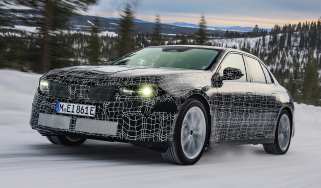
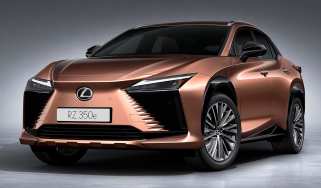
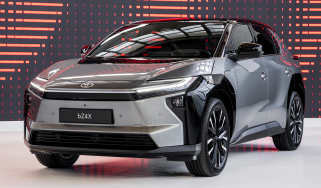
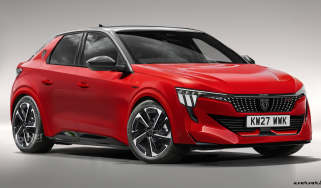
New Peugeot 208 coming soon with hot GTi version under consideration
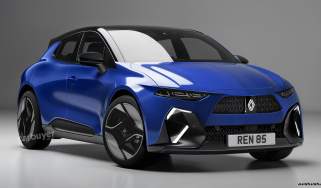
New Renault Clio to lean into “future icon” design, but EV version off the table
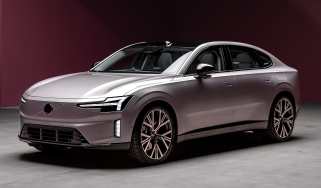
New Volvo ES90: flagship electric saloon unveiled with 435-mile range


